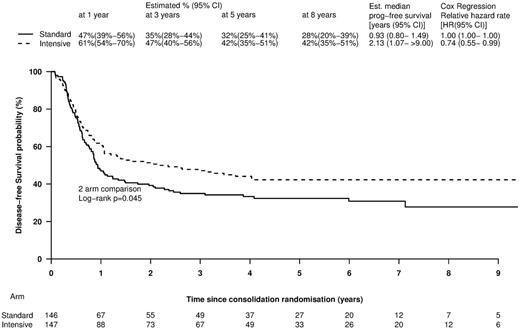Abstract
Background: Anthracylines are one of the major classes of drugs active against acute myeloid leukemia (AML). Increased doses of daunorubicin during induction therapy for AML have been shown to improve remission rates and survival. The ALLG used idarubicin in induction therapy at a dose of 9 mg/m2 x 3 days (total dose 27 mg/m2) in combination with high-dose cytarabine and etoposide (Blood 2005, 105:481), but showed that a total idarubicin dose of 36 mg/m2 was too toxic in this context (Leukemia 2001, 15:1331). In order to further improve outcomes in adult AML by anthracycline dose escalation, we conducted a phase 3 trial comparing standard to an increased idarubicin dose during consolidation therapy.
Methods: Patients achieving complete remission after 1 or 2 cycles of intensive induction therapy (idarubicin 9 mg/m2 daily x3, cytarabine 3 g/m2 twice daily on days 1,3,5 and 7, and etoposide 75 mg/m2 daily x7; ICE protocol) were randomized to receive 2 cycles of consolidation therapy with cytarabine 100 mg/m2 per day for 5 days, etoposide 75 mg/m2 for 5 days, and idarubicin 9mg/m2 daily for either 2 or 3 days (standard and intensive arms respectively). No further protocol therapy was given. The primary endpoint was leukemia-free survival from randomization to consolidation therapy (LFS) with overall survival (OS) as secondary endpoint.
Results: A total of 422 patients with AML (excluding cases with CBF rearrangements or APL) aged 16 to 60 years were enrolled between 2003-10, with 345 (82%) achieving complete remission, and 293 being randomized to standard (n=146) or intensive (n=147) consolidation arms. The median age was 45 years in both arms (range 16- 60), and both groups were balanced for intermediate versus unfavorable karyotypes and for frequency of mutations involving FLT3-ITD and NPM1 genes. Of the randomized patients, 120 in the standard arm (82%) and 95 in the intensive arm (65%) received the second consolidation cycle (p<0.001). The median total dose of idarubicin received in the 2 consolidation courses was 36 mg/m2 (range 17-45), or 99% (47-125%) of the protocol dose in the standard arm, versus 53 mg/m2 (18-73), or 98% (33-136%) of the protocol dose in the intensive arm. The durations of grades 3-4 neutropenia and thrombocytopenia were significantly longer in the intensive arm, but there were no differences in grade 3 or 4 non-hematological toxicities. There were no non-relapse deaths during consolidation on the standard arm and 2 in the intensive (0% vs 1%; p =0.50). Subsequently, 41 patients in the standard arm and 37 in the intensive arm underwent elective allogeneic BMT during first remission. On intention to-treat analysis uncensored for transplant and with a median follow-up time of 5.3 years (range 0.6 - 9.9), there was improvement in LFS in the intensive arm compared with the standard arm (3 year LFS 47% (95% CI 40-56%) versus 35% (28-44%); HR 0.74 (95% CI 0.55-0.99); p=0.045) (Figure 1). The 3 year OS for the intensive arm was 61% (95% CI 54-70%) and 50% (95% CI 43-59%) for the standard arm; HR 0.75 (95% CI 0.54-1.05); p=0.092). Although adverse cytogenetics, presence of FLT3-ITD mutation, and absence of NPM1 mutation were all associated with poorer outcomes, there was no evidence of a benefit of intensive consolidation being confined to specific cytogenetic or gene mutation sub-groups.
Conclusion: We conclude that in adult patients in complete remission after intensive induction chemotherapy an increased dose of idarubicin delivered during consolidation therapy results in improved LFS, without increased non-hematologic toxicity.
Szer:Ra Pharma: Honoraria, Membership on an entity's Board of Directors or advisory committees; Alexion Pharmaceuticals, Inc.: Honoraria, Membership on an entity's Board of Directors or advisory committees; Alnylam: Honoraria, Membership on an entity's Board of Directors or advisory committees. Marlton:Amgen: Honoraria, Membership on an entity's Board of Directors or advisory committees; AbbVie: Honoraria, Membership on an entity's Board of Directors or advisory committees; Janssen: Honoraria, Membership on an entity's Board of Directors or advisory committees, Speakers Bureau; Novartis: Honoraria, Membership on an entity's Board of Directors or advisory committees; Pfizer: Honoraria, Membership on an entity's Board of Directors or advisory committees; Roche: Honoraria, Membership on an entity's Board of Directors or advisory committees. Wei:Novartis: Consultancy, Honoraria, Research Funding; Roche: Consultancy, Honoraria; CTI: Consultancy, Honoraria; Abbvie: Honoraria, Research Funding; Servier: Consultancy, Honoraria, Research Funding; Celgene: Consultancy, Honoraria, Research Funding; Amgen: Consultancy, Honoraria, Research Funding. Cartwright:ROCHE: Consultancy, Membership on an entity's Board of Directors or advisory committees. Roberts:Servier: Research Funding; Janssen: Research Funding; Genentech: Research Funding; AbbVie: Research Funding. Mills:Novartis: Membership on an entity's Board of Directors or advisory committees, Other: Meeting attendance sponsorship. Gill:Janssen: Membership on an entity's Board of Directors or advisory committees. Seymour:Roche: Consultancy, Honoraria, Membership on an entity's Board of Directors or advisory committees, Speakers Bureau; Janssen: Consultancy, Honoraria, Membership on an entity's Board of Directors or advisory committees, Research Funding, Speakers Bureau; Gilead: Consultancy, Honoraria, Membership on an entity's Board of Directors or advisory committees, Speakers Bureau; Genentech: Consultancy, Honoraria, Membership on an entity's Board of Directors or advisory committees; Celgene: Consultancy, Honoraria, Membership on an entity's Board of Directors or advisory committees, Other: Travel support, Speakers Bureau; AbbVie: Consultancy, Honoraria, Membership on an entity's Board of Directors or advisory committees, Other: Travel support, Research Funding, Speakers Bureau; Takeda: Consultancy, Honoraria, Membership on an entity's Board of Directors or advisory committees.
Author notes
Asterisk with author names denotes non-ASH members.


This feature is available to Subscribers Only
Sign In or Create an Account Close Modal